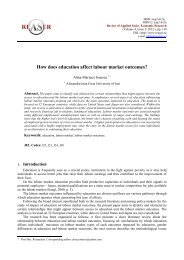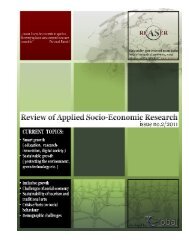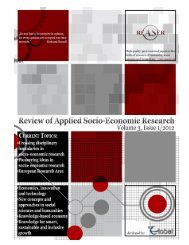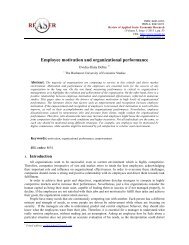new characteristics of inequalities in the information society and ...
new characteristics of inequalities in the information society and ...
new characteristics of inequalities in the information society and ...
Create successful ePaper yourself
Turn your PDF publications into a flip-book with our unique Google optimized e-Paper software.
ISSN: 2247-6172;<br />
ISSN-L: 2247-6172<br />
Review <strong>of</strong> Applied Socio- Economic Research<br />
(Volume 5, Issue 1/ 2013 ), pp. 81<br />
URL: http://www.reaser.eu<br />
e-mail: editors@reaser.eu<br />
Complete revolution <strong>in</strong> <strong>the</strong> psyche. Humans will move away from miseries <strong>and</strong> fear <strong>of</strong> <strong>the</strong> known or<br />
unknown <strong>and</strong> realize that what is real is <strong>the</strong> constant will to empower one’s <strong>in</strong>ner self <strong>and</strong> aim at absolute<br />
freedom <strong>of</strong> <strong>the</strong> psyche. We need energy not only to br<strong>in</strong>g about a total revolution <strong>in</strong> ourselves but also <strong>in</strong><br />
order to <strong>in</strong>vestigate, to look, to act. (1) .<br />
Morality is not <strong>the</strong> ultimate process <strong>of</strong> discovery but a process <strong>of</strong> creation. Seek <strong>the</strong>refore not to f<strong>in</strong>d<br />
‘who you are’ but to determ<strong>in</strong>e ‘who you want to be’. Latent good resides <strong>in</strong> every human be<strong>in</strong>g. Thus, use<br />
every moment <strong>of</strong> your life to th<strong>in</strong>k <strong>of</strong> <strong>the</strong> highest thought, highest word, <strong>and</strong> highest action (lead<strong>in</strong>g to <strong>the</strong><br />
highest good). (10) .<br />
Social Interactions <strong>and</strong> Mental Representation<br />
The mentally represented framework for morality is expla<strong>in</strong>ed with great precision <strong>in</strong> <strong>the</strong> subtle<br />
work<strong>in</strong>gs <strong>of</strong> <strong>the</strong> human m<strong>in</strong>d. Morality forms a major role <strong>in</strong> social <strong>in</strong>teraction dynamics as its two pillars are<br />
<strong>the</strong> <strong>in</strong>tentions latent <strong>in</strong> a be<strong>in</strong>g <strong>and</strong> its communication though emotive or l<strong>in</strong>guistic constructs. Morality <strong>in</strong> a<br />
person is guided by his conscience, <strong>in</strong> o<strong>the</strong>r words <strong>the</strong> <strong>in</strong>tentions. Social Interactions have identified a<br />
disconnect <strong>in</strong> <strong>the</strong> sense that when <strong>the</strong>re is transmission <strong>of</strong> sensory <strong>in</strong>formation to <strong>the</strong> bra<strong>in</strong> depend<strong>in</strong>g on <strong>the</strong><br />
circumstance, if <strong>the</strong>re is emotional stimulation with<strong>in</strong> , represented physiologically but when it comes to<br />
express<strong>in</strong>g those emotions through l<strong>in</strong>guistic constra<strong>in</strong>ts , one ei<strong>the</strong>r manipulates or tweaks <strong>the</strong>ir<br />
communication.<br />
Concept <strong>of</strong> right <strong>and</strong> wrong<br />
A child is born <strong>in</strong>to <strong>the</strong> <strong>society</strong> <strong>and</strong> his moral development entails learn<strong>in</strong>g <strong>the</strong> set <strong>of</strong> rules <strong>and</strong><br />
regulations <strong>of</strong> <strong>the</strong> <strong>society</strong>. Past studies reveal that if <strong>the</strong>re was no <strong>society</strong> <strong>the</strong>n a man has higher probability <strong>of</strong><br />
immorality. What is <strong>the</strong> concept <strong>of</strong> right <strong>and</strong> wrong <strong>the</strong>n? Elaborat<strong>in</strong>g on <strong>the</strong> concept <strong>of</strong> free choice, free will<br />
<strong>and</strong> conscience, one can ascerta<strong>in</strong> self-righteousness as <strong>the</strong> base to moral liv<strong>in</strong>g. ‘You are your own rule<br />
maker; you set your own guidel<strong>in</strong>es’ (1) . Every action has consequences <strong>and</strong> <strong>the</strong>se consequences are <strong>the</strong> set<br />
rules by nature.<br />
4. Conclusion<br />
Today, <strong>the</strong> question is: can we def<strong>in</strong>e morality as applicable to <strong>the</strong> complete humanity? Maybe No<br />
Morality can ever be enforced. A human is always faced with set <strong>of</strong> choices to act upon <strong>in</strong> any given<br />
situation. What he opts for is a derivative <strong>of</strong> his environment, mental condition<strong>in</strong>g <strong>and</strong> past sub-conscious<br />
impressions. The only universal emotional language is Love. The whole world is fearful. Emotions<br />
triggered <strong>of</strong>f due to fear will <strong>in</strong>vite unholy actions which is what plagues <strong>the</strong> world today. Thus, <strong>the</strong> only<br />
solution is that each person has to take responsibility for him <strong>and</strong> propel towards self-righteousness <strong>and</strong> <strong>the</strong><br />
social welfare <strong>of</strong> all consious entities is morality.<br />
5. References<br />
[1] Daisaku Ikeda, Sokka Gakkai <strong>in</strong>ternational quarterly (2005)<br />
[2] David Bostoc, Aristotle's Ethics [Paperback] , Oxford University Press (2000).<br />
[3] Kohlberg, Lawrence (1971). From 'is' to 'ought': How to commit <strong>the</strong> naturalistic fallacy <strong>and</strong> get<br />
away with it <strong>in</strong> <strong>the</strong> study <strong>of</strong> moral development. In Theodore Mischel (ed.).Cognitive development<br />
<strong>and</strong> epistemology. New York: Academic Press. pp. 151–284. ISBN 0-12-498640-4.<br />
[4] Krishnamurthy Jiddu, Freedom from <strong>the</strong> known ( 1969). (Published manuscript)








